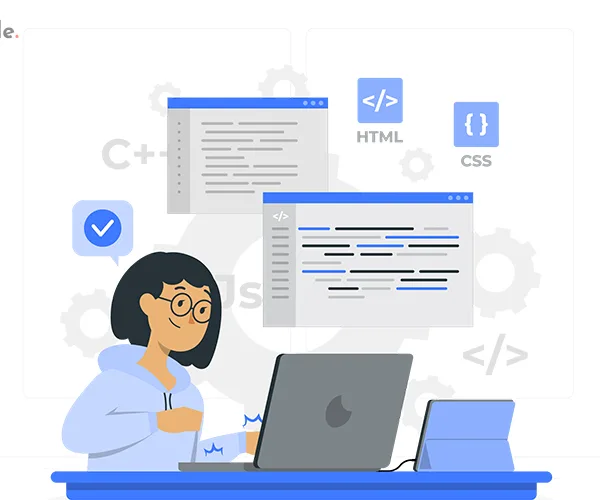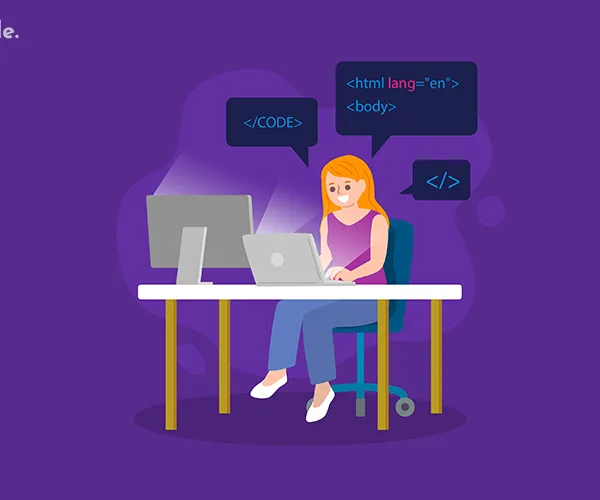Table of Contents
What is Java?
Java is a high-level, object-oriented programming language originally developed by Sun Microsystems (now owned by Oracle Corporation). It was designed to be platform-independent, meaning that Java programmes can run on any device or operating system that has a Java Virtual Machine (JVM) installed. This makes Java a popular choice for developing a wide range of applications, from desktop and web applications to mobile and enterprise systems.
Key Features of Java
Simple and Easy-to-Learn
Java was designed to be beginner-friendly and easy to learn. It has a clean syntax and provides a straightforward approach to programming. The language avoids complex features and concepts, making it accessible to developers of all skill levels
Object-Oriented
Java is based on the principles of object-oriented programming (OOP), which allows developers to create modular and reusable code. It provides features such as classes, objects, inheritance, and polymorphism, enabling developers to write efficient and organized code.
Platform-Independent
One of the significant advantages of Java is its platform independence. Java programs are compiled into bytecode, which can be executed on any platform that has a compatible JVM. This “write once, run anywhere” capability has made Java a popular choice for cross-platform development.
Robust and Secure
Java emphasises reliability and security. It includes features like automatic memory management (garbage collection), exception handling, and strict type checking, which help prevent common programming errors. Additionally, Java has built-in security mechanisms to protect against malicious code and ensure the safe execution of applications.
Rich Standard Library
Java comes with a comprehensive standard library that provides a wide range of pre-built classes and functions for common programming tasks. The standard library covers areas such as input/output, networking, database connectivity, graphical user interfaces, and more. This extensive set of libraries allows developers to build powerful applications without having to reinvent the wheel.
Vast Ecosystem and Community Support
Java has a vast ecosystem with a rich collection of frameworks, tools, and libraries developed by the community. These resources provide solutions for various application domains, including web development, enterprise systems, scientific computing, and mobile app
FAQs About Java
Q1: Is Java the same as JavaScript?
No, Java and JavaScript are distinct programming languages with different use cases and functionalities.
Q2: Can I only build desktop applications with Java?
No, Java is versatile. You can develop a wide range of applications, including web, mobile, and enterprise-level applications.
Q3: How do I handle exceptions in Java?
Java provides the try-catch block to handle exceptions. It allows you to catch and gracefully manage errors during program execution.
Conclusion
Congratulations! You’ve taken your first steps into the exciting realm of Java programming. We’ve covered its key concepts, highlighted its importance, and provided answers to some common questions. As you continue your learning journey, remember that practice is essential. Experiment with code, explore advanced topics, and watch as your programming skills flourish. Happy coding!
Feel free to reach out with more questions, and stay tuned for our upcoming blog posts diving deeper into the world of Java.




Your style is really unique in comparison to other folks I’ve
read stuff from. Many thanks for posting when you have the opportunity, Guess I
will just book mark this site.
Hello there, just became aware of your blog through Google, and found that it’s
really informative. I am gonna watch out for brussels. I will appreciate if you continue this
in future. Lots of people will be benefited from your writing.
Cheers!
I relish, result in I found exactly what I used to be
taking a look for. You have ended my four day lengthy hunt!
God Bless you man. Have a nice day. Bye
Hi there, I enjoy reading through your article.
I wanted to write a little comment to support you.
Hello there! This is my first visit to your blog! We are a collection of volunteers and
starting a new initiative in a community in the same niche.
Your blog provided us beneficial information to work on. You have done a outstanding job!
I am not positive where you’re getting your information, however great topic.
I must spend some time studying more or understanding more.
Thanks for excellent information I used to be looking for
this information for my mission.
I need to to thank you for this good read!! I absolutely loved every bit
of it. I’ve got you saved as a favorite to look at new things you post…
Spot on with this write-up, I actually believe that this site needs much more attention. I’ll probably be back again to read more,
thanks for the information!
Very nice blog post. I absolutely appreciate this site.
Thanks!
I am regular visitor, how are you everybody? This article posted at this website is actually good.
Way cool! Some very valid points! I appreciate you writing this article
and also the rest of the website is also very good.
Thanks for finally writing about > Introduction to Java:
A Beginner's Guide to the World of Programming – howtolearn(code) < Loved it!
I do not even know how I ended up here, but I thought this post was great.
I do not know who you are but certainly you’re going to a famous
blogger if you are not already 😉 Cheers!
I’m not that much of a internet reader to be honest but your sites really nice, keep it up!
I’ll go ahead and bookmark your website to come back down the road.
Cheers
you are really a good webmaster. The web site loading
velocity is amazing. It sort of feels that you are doing any
distinctive trick. In addition, The contents are masterpiece.
you have performed a fantastic task on this subject!
Thank you, I’ve just been searching for information approximately this subject for a while
and yours is the greatest I’ve discovered till now.
However, what in regards to the bottom line? Are you positive about
the source?
That is really fascinating, You are an excessively skilled blogger.
I have joined your rss feed and stay up for searching for more of your great post.
Additionally, I’ve shared your website in my social networks
You actually make it seem so easy with your presentation but I find this topic to be
really something that I think I would never understand.
It seems too complex and extremely broad for me. I am looking forward for your next post, I’ll try to get
the hang of it!
It’s awesome in favor of me to have a website, which is good for my
knowledge. thanks admin
Excellent web site you’ve got here.. It’s difficult to find high-quality writing
like yours nowadays. I honestly appreciate people like you!
Take care!!
Attractive section of content. I just stumbled upon your website and in accession capital to assert
that I acquire actually enjoyed account your blog posts.
Anyway I’ll be subscribing to your feeds and even I achievement you access consistently rapidly.
Hello mates, its fantastic piece of writing concerning cultureand fully explained, keep it up all the time.
Touche. Great arguments. Keep up the good effort.
Wow, this paragraph is fastidious, my sister is analyzing these kinds of things,
therefore I am going to tell her.
I’m not sure where you’re getting your info, but great topic.
I needs to spend some time learning much more or understanding more.
Thanks for wonderful information I was looking for this info
for my mission.
Pretty! This has been an incredibly wonderful article. Thanks for providing this info.
Thank you for any other great post. Where else could anyone get that type of
info in such a perfect approach of writing? I have a presentation next week,
and I am at the look for such info.
My brother suggested I might like this web site.
He was totally right. This post actually made my day.
You can not imagine simply how much time I had spent for this info!
Thanks!